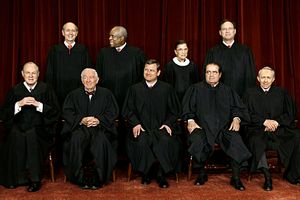
Sports league antitrust rules
In an article reassuringly titled Antitrust case could be Armageddon, ESPN columnist Lester Munson describes how an upcoming Supreme Court decision could change the pro sports landscape.


Labels:
legal,
NFL,
sports,
Supreme Court
Subscribe to:
Post Comments (Atom)
It sounds like the crux of the case rests on the NFL being defined as a "single entity", beacuse it is a single sports entertainment league competing with other sports entertainment providers for market share. Currently it is defined as a league with antitrust protections, and the 32 teams are considered competitors for players, coaches, wins, etc.
ReplyDeleteHowever, the teams aren't really competitors for profit - the league profits as a whole and has revenue-sharing. Do you think the NFL is more of a single team, with 32 parts, or do you think all 32 clubs are in direct competition?
My basic understanding is that under the collective bargaining agreement, the approximate value of TV revenue is pretty close to the total payroll of all players (or possibly players' salaries and league wide benefits, such as the league office admin costs and health care and retirement benefits). The owner's cut seems to approximate fairly closely with what they are able to make from ticket and merchandise sales minus the expenses of hosting a game).
ReplyDeleteI don't think this case will be as defining one way or the other as people expect. I think they will rule that, in terms of TV rights, logo, apparel, merchandising, etc., this is one single entity, but the Supreme Court will be very careful to protect the players rights (the right of a union to negotiate on their behalf) and this ruling will not extend to any kind of ability to limit the salary of players or coaches. Unfortunately, if SCOTUS ruled against the NFL, it would be a stepping stone to removing the NFL Sunday Ticket from Dish Network and making it available through all cable companies, but I don't think the government will ever force this. The NFL will have to succumb to public opinion and pressure from fans as consumers to do so voluntarily.
So addressing the specific "what-ifs" that are brought up. LeBron James will be able to sign with whomever pays him the most. The best, coaches will be paid more as higher demand increases their asking price. The Cubs will not be able to broadcast their own games, without express written permission from MLB and all online webcasts will be through mlb.com.
The Red Wings sweater costing $300 will not happen, but not because they law protects the NHL from antitrust suits. The NHL will make a deal so Reebok is the official apparel producer of NHL gear, but Reebok will still follow the basic economic rules of supply and demand (and lesser rules of production and inventory, etc.) and if all sweaters cost $300 no one would buy them until the price came back down to $80.
I agree with you that if the Court rules in favor of the NFL, it will be very specific about what details it is putting into the "single entity" category. Of course I don't know anything about law, that's just a guess.
ReplyDeleteBut the Supreme Court doesn't strike me as a gorup that would make rash decisions without concern for their consequences.
I'm not sure I care about the apparel and licensing deal - that isn't directly impacting anyone's enjoyment of sports, cause merchandise has zero impact on the results. Everything else, however, does.
Except that TV rights will follow the exact same law that apparel and merchandise licensing will. Your ability to view the game does not affect the outcome of the game, but it does make the NFL the most successful league in the US.
ReplyDeleteApparel and TV rights both are outside companies negotiating to be the sole distributor of an NFL product.
This ruling won't affect free agency, but it will affect TV viewership and specific issues including the NFL Network, CBS showing the AFC and Fox showing the NFC, NBC's Sunday Night Football, ESPN's Monday Night Football (not every household has cable), NFL Sunday Ticket. As a Chargers fan, I have to go to a sports bar (which I really don't mind) to watch about half the Chargers games while I live in the bay area.
Will the ruling affect TV deals with the NFL though? It seems like the league already acts like a single entity when it comes to negotiating deals. They can pull whoever they want from their games if they don't agree with what they're getting paid. And in that sense, they are competing only with other sports - or at least TV programs - for viewers.
ReplyDeleteIf SCOTUS rules against the NFL, and determines there are 32 separate businesses, then all the businesses working together to broadcast only on certain networks would violate the "combination, contract or conspiracy" aspect of antitrust laws. Meaning every network wishing to show NFL games could approach each individual team to make a better offer. Maybe Versus shows Raiders games in Oakland, and if you live in Florida and want to watch the Raiders, you have to watch Versus, while Fox shows the Cowboys and Texans. It could be that every cable operator has the NFL Sunday Ticket. The Chargers get a great deal by working with Channel 4, but that means that I will have to pay $10/month to get that channel in my home.
ReplyDelete